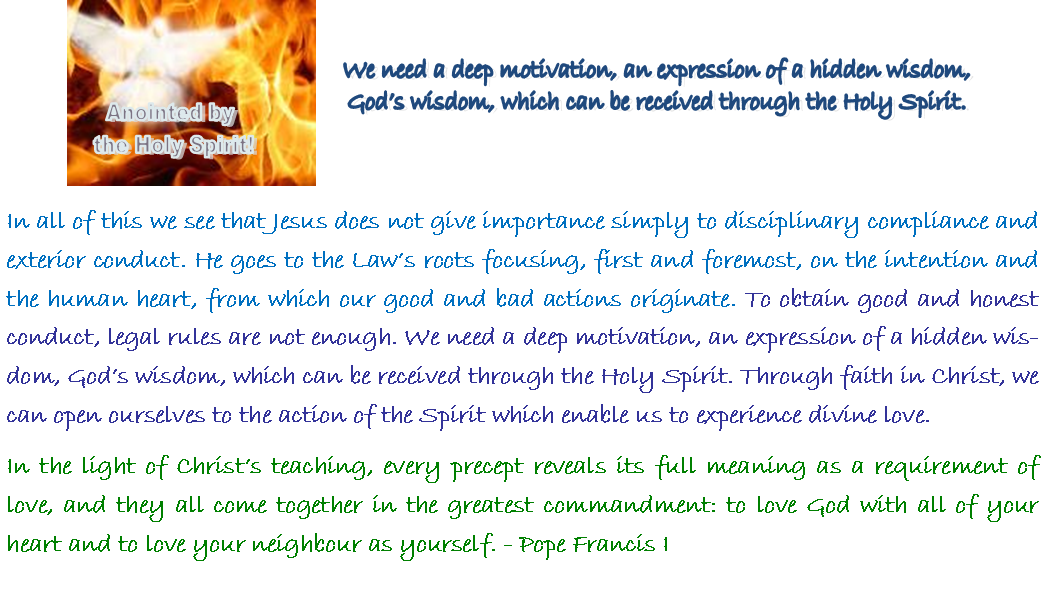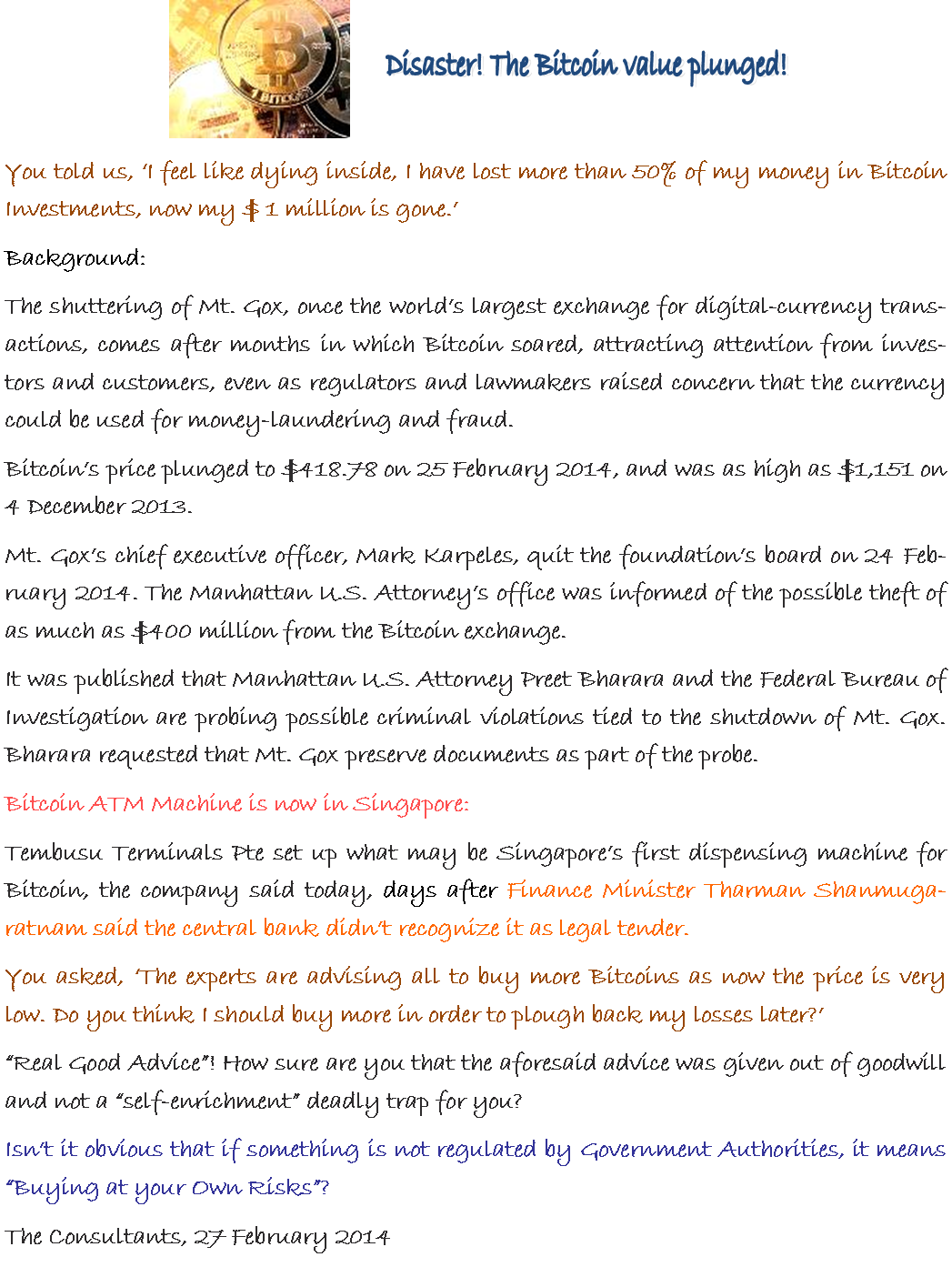|
131 |

|
PASTORAL VISIT TO THE ROMAN PARISH HOMILY OF POPE FRANCIS Sunday, 16 February 2014
One time, the disciples of Jesus were eating grain because they were hungry; but it was Saturday and on Saturday grain was not allowed to be eaten. Still, they picked it [rubbing his hands together] and ate the grain. And they [the Pharisees] said: “But look at what they are doing! Whoever does this breaks the Law and soils his soul, for he does not obey the Law!”. And Jesus responded: “nothing that comes from without soils the soul. Only what comes from within, from your heart, can soil your soul”. And I believe that it it would do us good today to think not about whether my soul is clean or dirty, but rather about what is in my heart, what do I have inside, what I know I have but no one else knows. Being honest with yourself is not easy! Because we always try to cover it up when we see something wrong inside, no? So that it doesn’t come out, don’t we? What is in our heart: is it love? Let us think: do I love my parents, my children, my wife, my husband, people in the neighbourhood, the sick?... Do I love? Is there hate? Do I hate someone? Often we find hatred, don’t we? “I love everyone except for this one, this one and that one!”. That’s hatred, isn’t it? What is in my heart, forgiveness? Is there an attitude of forgiveness for those who have offended me, or is there an attitude of revenge — “he will pay for it!”. We must ask ourselves what is within, because what is inside comes out and harms, if it is evil; and if it is good, it comes out and does good. And it is so beautiful to tell ourselves the truth, and feel ashamed when we are in a situation that is not what God wants, it is not good; when my heart feels hatred, revenge, so many situations are sinful. How is my heart?...
Jesus said today, for example — I will give only one example: “You have heard that it was said to your ancestors, ‘you shall not kill’. But I say to you, whoever is angry with his brother has killed him in his heart”. And whoever insults his brother, kills him in his heart, whoever hates his brother, kills his brother in his heart; whoever gossips against his brother, kills him in his heart. Maybe we are not conscious of it, and then we talk, “we write off” this person or that, we speak ill of this or that ... And this is killing our brother. That is why it is important to know what is inside, what is happening in my heart. If one understands his brother, the people, he loves his brother, because he forgives: he understands, he forgives, he is patient.... Is this love or hate? We must be sure of this. And we must ask the Lord for two graces. The first: to know what is in our own heart, not to deceive ourselves, not to live in deceit. The second grace: to do what is good in our hearts and not to do the evil that is in our hearts. And as for “killing”, remember that words can kill. Even ill-will toward another kills. Often, when we listen to people talking, saying evil things about others, it seems like the sin of slander. The sin of defamation had been removed from the Ten Commandments and yet to speak evil of a person is still a sin. Why is speaking ill of another a sin? Because there is hatred in my heart, aversion, not love. We must always ask for this grace: to know what is happening in our heart, to constantly make the right choice, the choice for good. And that the Lord help us to love one another. And if I cannot love another well, why not? Pray for that person, pray that the Lord make me love him. And like this we move forward, remembering that what taints our lives is the evil that comes from our hearts. And that the Lord can help us. |

|
POPE FRANCIS ANGELUS Saint Peter's Square
Dear Brothers and Sisters, Good morning!
This Sunday’s Gospel continues the “Sermon on the Mount”: Jesus’ first great preaching. Today’s theme is Jesus’ attitude toward the Jewish Law. He says: “Think not that I have come to abolish the Law and the Prophets; I have come not to abolish them but to fulfil them” (Matthew 5:17). Jesus did not want to do away with the Commandments that the Lord had given through Moses; rather, he wanted to bring them to fulfilment. He then added that this “fulfilment” of the Law requires a higher kind justice, a more authentic observance. In fact, he says to his disciples: “Unless your righteousness exceeds that of the scribes and Pharisees, you will never enter the kingdom of heaven” (Matthew 5:20).
But what does this “fulfilment” of the Law mean? What is this superior justice? Jesus himself answers this question with a few examples. Jesus was practical and he always used examples to make himself understood, comparing the old Law with his teachings. He begins with the fifth of the Ten Commandments: “You have heard that it was said to the men of old, ‘You shalt not kill’ ... But I say to you that everyone who is angry with his brother shall be liable to council” (v. 21-22). In this way, Jesus reminds us that words can kill! When we say that a person has the tongue of a snake, what does that mean? That their words kill! Not only is it wrong to take the life of another, but it is also wrong to bestow the poison of anger upon him, strike him with slander, and speak ill of him.
This brings us to gossip: gossip can also kill, because it kills the reputation of the person! It is so terrible to gossip! At first it may seem like a nice thing, even amusing, like enjoying a candy. But in the end, it fills the heart with bitterness, and even poisons us. What I am telling you is true, I am convinced that if each one of us decided to avoid gossiping, we would eventually become holy! What a beautiful path that is! Do we want to become holy? Yes or no? [The people: Yes!] Do we want to be attached to the habit of gossip? Yes or no? [The people: No!] So we agree then: no gossiping! Jesus offers the perfection of love to those who follow him: love is the only measure that has no measure, to move past judgements.
Love of neighbour is a fundamental attitude that Jesus speaks of, and he says that our relationship with God cannot be honest if we are not willing to make peace with our neighbour. He says: “So if you are offering your gift at the altar, and there remember that your brother has something against you, leave your gift there before the altar and go; first be reconciled to your brother, and then come and offer your gift” (v. 23-24). Therefore we are called to reconcile with our neighbour before showing our devotion to the Lord in prayer.
In all of this we see that Jesus does not give importance simply to disciplinary compliance and exterior conduct. He goes to the Law’s roots focusing, first and foremost, on the intention and the human heart, from which our good and bad actions originate. To obtain good and honest conduct, legal rules are not enough. We need a deep motivation, an expression of a hidden wisdom, God’s wisdom, which can be received through the Holy Spirit. Through faith in Christ, we can open ourselves to the action of the Spirit which enable us to experience divine love.
In the light of Christ’s teaching, every precept reveals its full meaning as a requirement of love, and they all come together in the greatest commandment: to love God with all of your heart and to love your neighbour as yourself.
-----------------------------------------------------------------
After the Angelus:
I greet with affection all the Romans and pilgrims present, the families, the parishes, and the youth from many countries around the world. I particularly greet the many faithful from the Czech Republic who have accompanied their bishops here for their ad limina visit, and the Spanish pilgrims from the dioceses of Orihuela-Alicante, Jerez de la Frontera, Cádiz y Ceuta.
I greet the parish groups from Calenzano, Aversa and Naples; those from Santa Maria Regina Pacis in Ostia and from Sant’Andrea Avellino in Rome; as well as the Guanelliano Youth Movement, the young people from the Arcobaleno di Modena Movement and the Choir of Santo Stefano di Caorle.
I wish everyone a good Sunday and a good lunch! Goodbye!
Acknowledgment: We thank the Vatican Publisher for allowing us to publish the Homilies of Pope Francis I, so that it could be accessed by more people all over the world; as a source of God’s encouragements to all of us. |


|
1st Reading: Extracted from the book of Leviticus 19:1-2,17-18 The Lord spoke to Moses; he said: ‘Speak to the whole community of the sons of Israel and say to them: ‘“Be holy, for I, the Lord your God, am holy. ‘“You must not bear hatred for your brother in your heart. You must openly tell him, your neighbour, of his offence; this way you will not take a sin upon yourself. You must not exact vengeance, nor must you bear a grudge against the children of your people. You must love your neighbour as yourself. I am the Lord.”’ |

|
Responsorial Psalm 102:1-4,8,10,12-13 The Lord is compassion and love.
My soul, give thanks to the Lord all my being, bless his holy name. My soul, give thanks to the Lord and never forget all his blessings.
It is he who forgives all your guilt, who heals every one of your ills, who redeems your life from the grave, who crowns you with love and compassion.
The Lord is compassion and love, slow to anger and rich in mercy. He does not treat us according to our sins nor repay us according to our faults.
As far as the east is from the west so far does he remove our sins. As a father has compassion on his sons, the Lord has pity on those who fear him.
2 March 2014 |